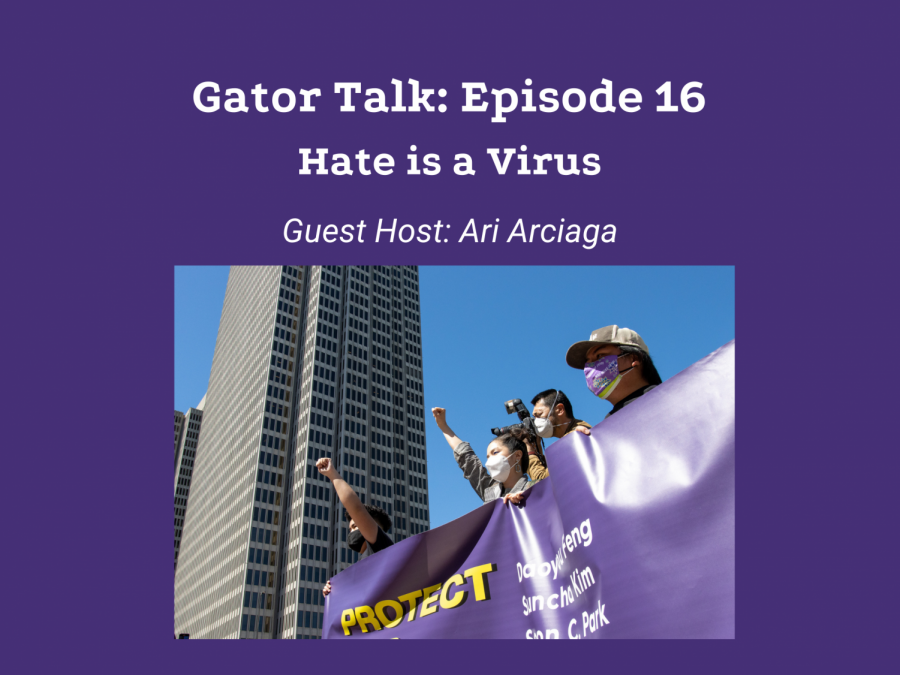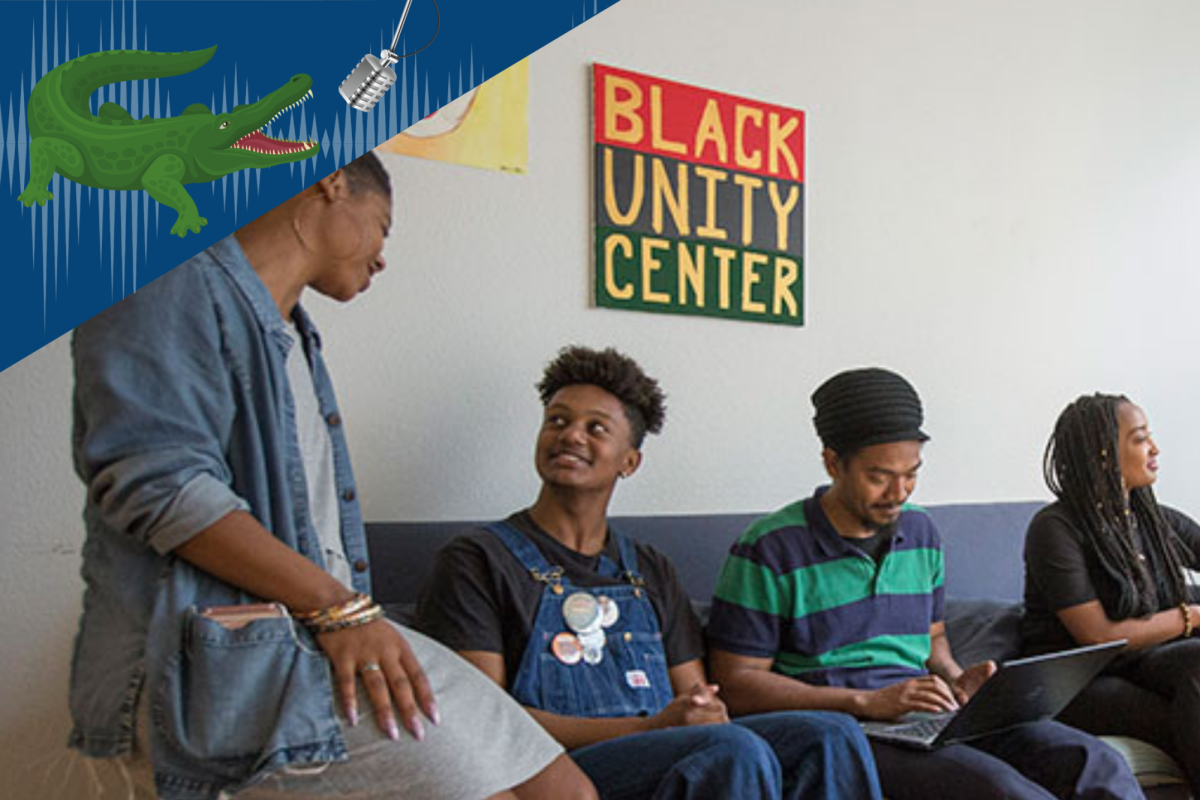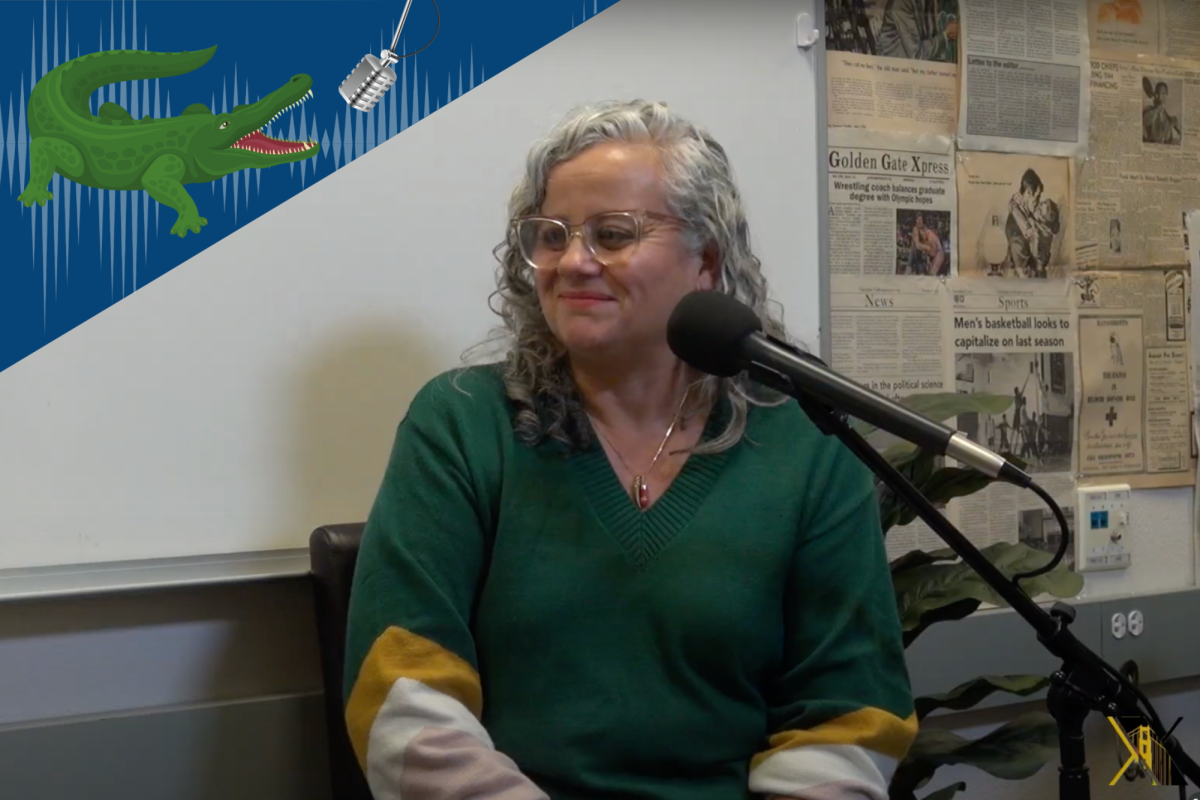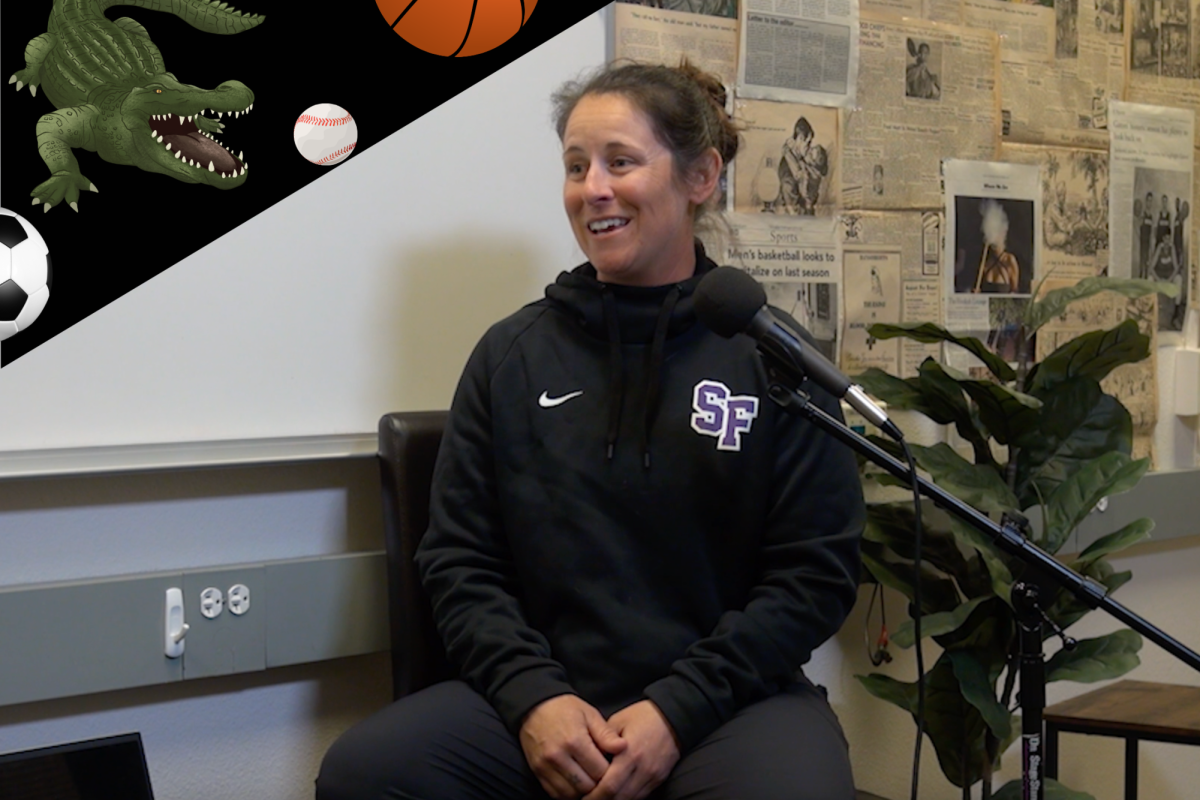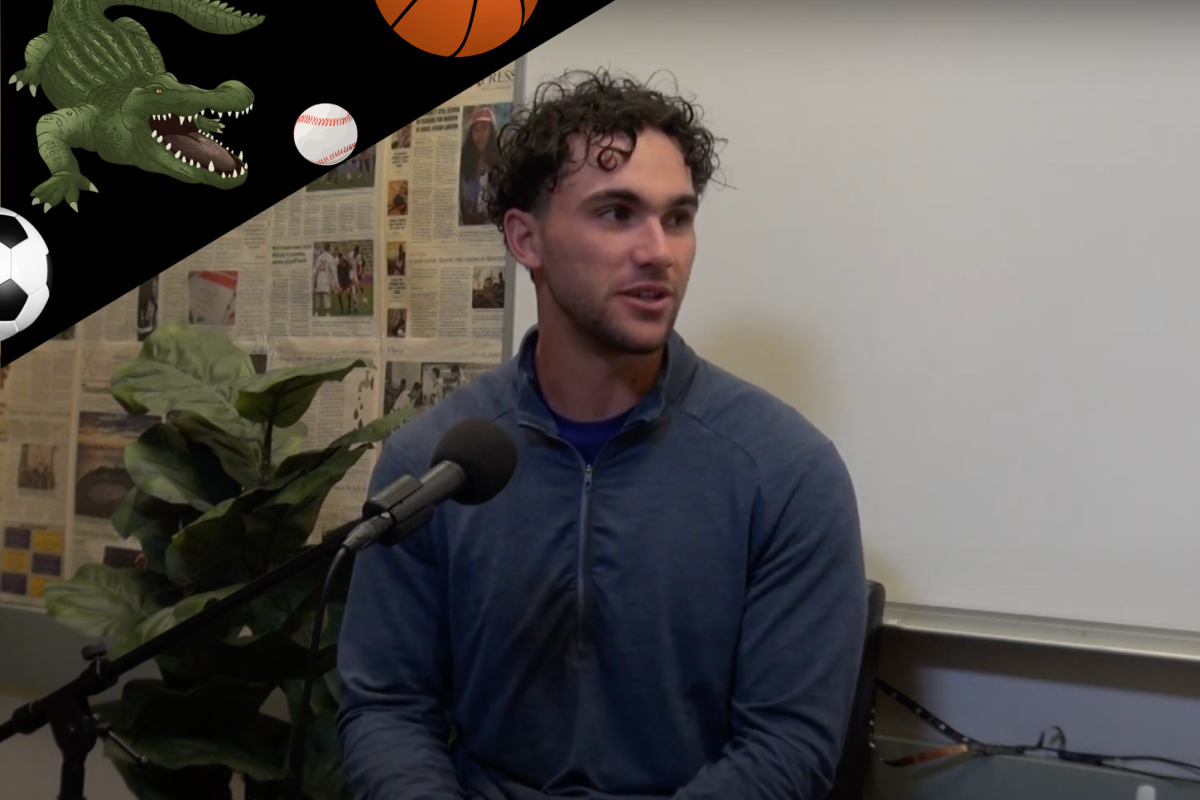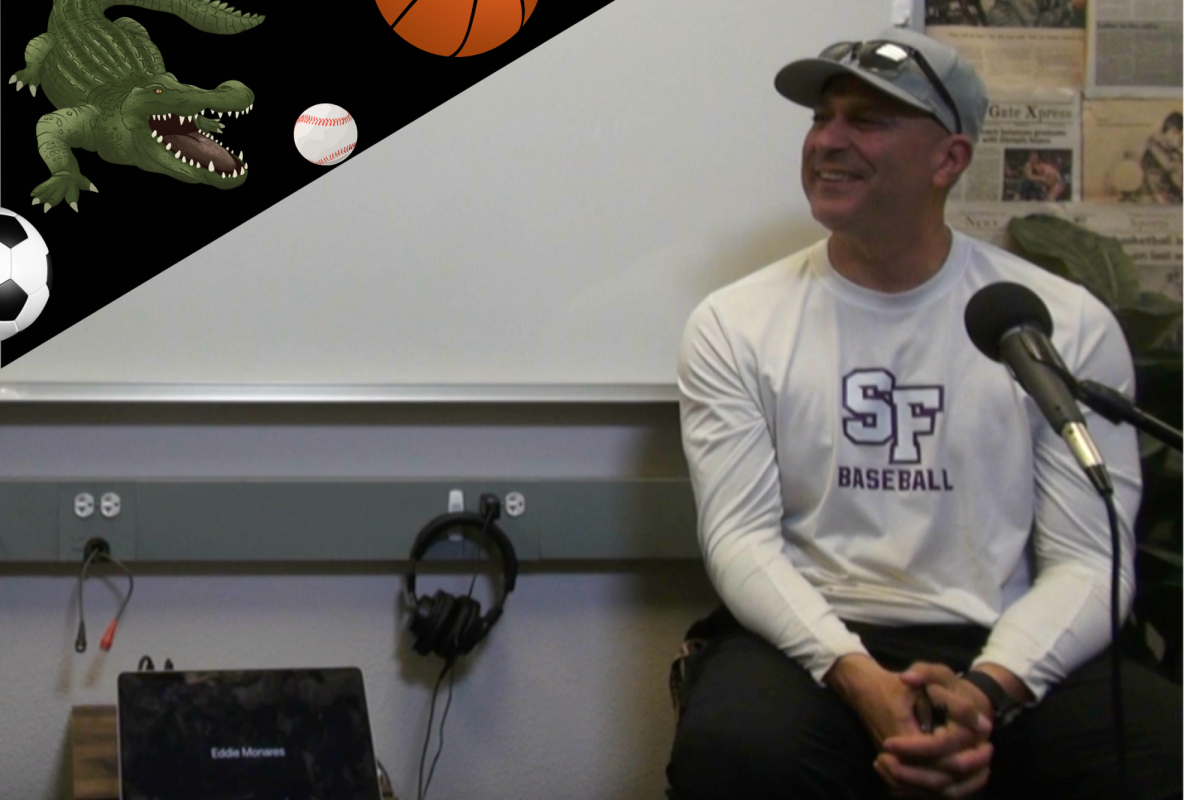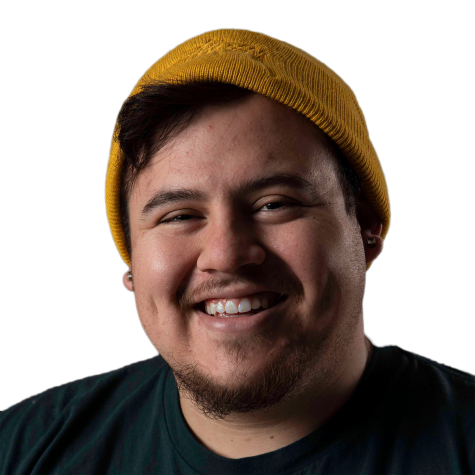Welcome to Gator Talk, a collaborative CalState podcast that brings city and statewide perspectives to SF State news.
Guest host Ari Arciaga leads this special opinion episode for AAPI Month where she talks about recent hate crimes and model minority myth with a variety of sources.
TRANSCRIPT:
Gator Talk Intro
Ari: Hello everyone! My name is Arianne Arciaga, I’m a city news reporter from Golden Gate Xpress and this is a special Gator Talk opinion episode.
There won’t be a news brief for this episode so we’ll jump right into it.
*B-Roll audio of the protest fades in*
Preview of the Show
Ari: Throughout the episode, I will discuss the violence and ongoing racism that has been going on against AAPI communities.
*B-Roll audio of the protest fades out*
But what does AAPI mean? AAPI stands for Asian Americans and Pacific Islanders. The Asian Pacific Institute defines AAPI as, “all people of Asian, Asian American or Pacific Islander ancestry, who trace their origins to the countries, states, jurisdictions and/or the diasporic communities of these geographic regions.”
Main Story
Ari: The month of May is known as Asian American and Pacific Islander Heritage Month. During this month, we recognize their achievements, their culture and their history. It has been a big year for the AAPI community where they have nominations from the Oscars, the Grammys, and a nomination for a Nobel Peace Prize. However, it has also been a difficult year for AAPI communities.
Since the COVID-19 outbreak last year, hate crimes against Asian Americans began to rise. StopAAPIHate reported 3,795 incidents from March 19, 2020, to February 28, 2021. These crimes range from name-calling to physical assault.
More recently on May 5, 2 Asian women were stabbed by Patrick Thompson with a large military-style knife. These attacks, especially on our elders, are not stopping.
San Francisco State University Asian American Studies Professor Russell Jeung, one of the co-founders of STOPAAPI, created the organization once COVID-19 started to take over. Jeung said that once the website opened they were flooded with hundreds of incidents. One incident hit Professor Jeung hard.
Jeung: One is an Asian went to summer camp. He was only eight years old. And all the kids started playing Coronavirus tag, and they made him it. And they kept on teasing him. You’re the Coronavirus. And the counselors didn’t do anything. And we kept on teasing him until finally, he started crying. And then those counselors finally stopped it. And for me, it’s just so sad that again, kids are bullying and gang bullying on individual Asians are sort of too young to be treated that way. [02:04]
Ari: From those 3,795 incidents that have been reported:
- 68.1% of that was Verbal Harassment
- 20.5% was Shunning
- 11.1% was Physical Assault
- 8.5% was civil rights violations which include, discrimination in the workplace, refusal of service, and being barred from transportation
- And lastly, 6.8% faced online harassment
In Atlanta, six Asian women were killed. In San Francisco, an elderly Asian woman was beaten on the streets. In New York another Asian American elder was beaten right in front of security and they didn’t help. Even Former President Donald Trump has contributed to these AAPI hate crimes by referring to COVID-19 as the “China Virus” or the “Kung Flu,” despite the disease having no national origin and being told that, the phrase is straight-up racist.
Donald Trump Audio: Not racist at all. No, not at all. It comes from China.
Ari: San Francisco State University Asian American Studies Professor Arlene Daus-Magbual, reflects on the time she was an Education Coordinated at the Asia Pacific American Legal Center 20 years ago. She says she remembers tracking the hate crimes that were happening against Muslims and South Asians when 9/11 hit. Magbual says that crimes against the AAPI community are not new and this is something that is happening all the time.
Arlene: You got to really think about like in history, there’s always this scapegoating. And there’s always this, I want me to blame somebody and when we blame them there’s this, this rhetoric that comes out. And we heard the rhetoric from the past president last year, we heard the rhetoric Well, how he called it Chinese virus, China virus come flew in that and from there, it just kind of exacerbated this backlash, right. [04:06]
Ari: As Professor Magbual mentioned, AAPI hate is not something new. It goes back as far as 1882 where the Chinese Exclusion Act prohibited Chinese immigration for the next ten years and declared Chinese immigrants ineligible for citizenship. However, in 1902 Chinese immigration was made permanently illegal until 1943.
Then we have the infamous murder of Vincent Chin in 1982. Before I continue, the story contains graphic content and explicit language. Vincent Chin was murdered by two white autoworkers, Ronald Ebens, and his stepson Michael Nitz with a baseball bat. Some witnesses of the murder have said that Ebens said to Chin, “It’s because of you little m—f—s that we’re out of work.” And to make the death of Vincent Chin worse, both of his killers had a fine of $3,000 each and faced no prison time.
Though with the history of AAPI hate crimes, why does it feel like this is all new?
Anita Varma, the board member of the Society of Professional Journalism NorCal, says that video recordings that go viral play a huge factor in the discussion of AAPI hate crimes. Many of the AAPI incidents have been recorded and put all over the mass media. Varma continues to say that because these videos show evidence of assault it catches media attention.
Anita: The outpouring of calls for racial justice in this country was such that anyone who was in a public-facing role likely paid attention now whether they agreed or disagreed is a separate matter, but they were attentive to it in a way that I think also contributes to conditions for more attention. Now, as we notice that these are not isolated incidents and that they’re persisting. [05:56]
Ari: Asian Americans can be seen as foreigners, aliens, dirty, and disease carriers, but at the same time, people from the AAPI community are seen as intelligent, hard-working and successful and that’s where this Model Minority Myth comes from.
La Raine Gonzalez, Asian American Studies Major at SF State and ASPIRE peer mentor, says that the model minority myth is when Asians are stereotyped, more towards white than black in the white versus black spectrum.
La Raine: Most stereotypes for Asians are they’re smart, they’re silent. They’re hardworking, all of that. But that’s just like the model minority myth because once that switches, once an Asian person isn’t intelligent isn’t hard working. They’re directly compared to black people. And I think like, they created this model minority myth specifically to attack all minorities. [06:50]
Ari: I hate seeing this model minority label being put on the AAPI community. Though this model minority myth is supposed to be a “positive” outlook on Asian Americans, Asian Americans will still go through racial violence, segregation, unequal access to public institutions, and discrimination in housing, employment, and education. It makes it seem like the AAPI communities is somehow “protected” from these issues when we’re not. We are still facing racism, we still face violence and we still face segregation.
Timothy Bautista, ASPIRE peer mentor at SF State, Professor Arlene and Anita share their experiences on the negative impact the model minority myth has had on them.
Tim: I put it on myself to be competitively like academic to, or academically competitive, too, but I couldn’t just live up to it.
And throughout high school, I always felt like, I wasn’t smart, or I wasn’t, like, good enough for it, like for college or for anything, but it really it wasn’t me, it was just the classes that I would take and were too hard for me, when really I could have slowed down days and stuff.
I feel like, you know following or being labeled as a model minority is putting this unnecessary pressure that I feel like would negatively affect even more vulnerable communities. I also feel like it creates unnecessary competition, especially in the field, like, we’re all supposed to be learning, we’re all supposed to be moving forward together, this isn’t really the time where we should be stepping over one another to get to where we want. [08:07]
Arlene: I remember being in math class, and someone cheated off me and then he got an F, because I was not good at math. And he was like, he got mad at me after we got the paperback and he blamed me, for him failing the math test. This was sixth grade when I first moved to Riverside, and I didn’t realize this model minority myth thing until then, and he was like, you’re supposed to be good at math. I was like, who said, I suck at math. I’ve always sucked at math. And I was like, I don’t know this math. And he, like he, like, started, like, taunting me. He was calling me these names. He was calling me these stereotypical Asian names I’ve never heard until I moved to Riverside. And he was like, I’m never copying off you again. You know, I’m not good. I hope you don’t, because I failed with math, you know, and, and then I realized, like, why do they think I’m supposed to be smart? Or why do they think that I’m supposed to be like a foreigner, like, they always treated me as if I didn’t speak English? And then they would put me in ESL classes. [08:57]
Anita: I was very bad at math, I was very bad at science. And my teachers were genuinely concerned in a way that they were not concerned about non-Asian students who struggled in math and science
I was one of two Asian people in my entire school. This was in the 80s, in western Pennsylvania. And the teachers were very, very good at their jobs. But they had this assumption that Anita will be good at math and science. And when she’s not, when she’s good at English, there’s something wrong here, there was something that didn’t make sense to them. [09:49]
Ari: And now we’re gonna take a quick break –
Break
Support the Golden Gate Xpress’ work by signing up for our online newsletter, following us on Instagram or Twitter @ GGXnews and visiting the website: https://goldengatexpress.org
- break ends –
Ari: After a surge of violence against the AAPI community, thousands of people across the United States came together to raise awareness of the ongoing racial discrimination Asians have faced.
Golden Gate Xpress reporter Jian Yang took to the streets of San Francisco where the Rise Up with Asians Rally was taking place.
David Kim: You just show up for our brothers and sisters, we show up for each other whether you know, these people or not, it’s something that community and community is so important to us and something that this country lacks. And I think that it’s very clear that the Asian community will show up for each other. [11:03]
Ari: Growing up as an Asian American, you learn not to voice out your problems or your opinion. You learn to keep it to yourself and solve it on your own. You’re pretty much silenced. But seeing thousands of people, not just from the AAPI community come together to fight and bring awareness to the problem the AAPI community faces makes me feel hopeful.
Bea: And I feel like with Asian Americans, because we’re like the model, under the model minority, we don’t have that chance to, like stand up for ourselves to like, really talk about issues that we face on we tend to, like kind of just keep it in. And I think now is really the time to go out there and like, talk about the issues that we’re facing, and to stand up for other Asian Americans. And it’s also really important to address that there’s different groups in the Asian American community. [11:43]
Ari: What has been happening in the AAPI community has been absolutely heartbreaking. Yes, it’s great that these issues in the AAPI community are finally coming to life, however, this fight isn’t over. We need to continue these conversations on discrimination, racism and violence that’s not only happening in AAPI communities but also all minority communities.
Timothy Bautista, Anita Varma, Professor Jeung, Professor Arlene and La Raine gave their thoughts on how we can keep the conversation alive on AAPI hate.
Tim: I would say, first educate. Of course, I’m like, talk about it in classes, even though it’s an uncomfortable topic, that’s not something that we can avoid, I feel like, it’s something that we all need to wade through together. [12:50]
Anita: I think this kind of conversation is really important to continue talking about it, that it’s not old news. It’s not sort of done and dusted. And seeing that coverage continue. We saw that in the case of the border crisis when it started more than two years ago at the US Mexico border, and how that coverage has continued even when it’s not the you know, the quote on quote, hot topic. [13:06]
Jeung: I think people make a mistake. If it’s not online, then it doesn’t exist. But it does exist, right. But the issue exists, and the conversations and the education to address it and policies to reduce it. They’re also continuing and so STOP AAPI Hate, we’re going to be around we’re going to be trying to promote ethnic studies to educate people, we’re going to try to expand civil rights protections, so we don’t face so much harassment. [13:31]
Arlene: I think the reporting is big. Even if it’s not to the cops, I feel like the reporting should happen with community-based organizations who have been doing this work for years, years and years and years, civil rights groups have been collecting data for a very long time, stop API hate has been such a great resource for a lot of our students, faculty, staff, even their families
Because even if we’re not reporting like certain microaggressions, or racism in the classroom, or racism in the workplace, we’re still experiencing these things.
La Raine: I think, really, we just got to keep talking about it. Like, it’s up to us, like, no one else is going to help us but ourselves, no one else is going to protect us, but ourselves. [14:34]
End
Ari: These conversations can’t stop. I’m tired of not seeing my community being represented, I’m tired of my community being seen as a model minority and I’m tired of seeing support for the community one day and then the next day it’s forgotten. Let’s continue these conversations and let’s continue to support one another.
Hate is a virus.
Before I end the podcast, special thanks to Jian Yang and Lay-la for contributing to this podcast.
*-Roll audio of the protest fades in*
Ari: My name is Arianne Arciaga, reporter for the Golden Gate Xpress and I’m signing off.
*B-Roll audio of the protest fades out*






